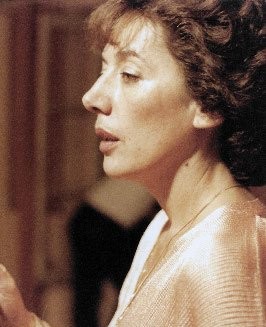Danielle at La Roquelle
by Catherine Healey, University Lecturer in History, New York University

Like so many of us here, I first knew Danielle as the always elegant somewhat remote Director of Reid Hall presiding over staff meetings in the Grande Salle with her graceful authority and constant kindness.
But I really didn't know her properly until one day at the foot of the stairs leading up to her office and to my garret on the third floor, I ventured: "Je crois que nous sommes voisines à la campagne."
She looked at me and said: "Mais c'est vous les Américaines de Buffières!" And with that Alice and I were introduced to the world of Reid Hall in Southern Burgundy.
La Roquelle, her beloved house and garden at Saint André le Désert, half an hour away from that other center of learning and intellectual exchange that was - the medieval Abbey of Cluny - is a traditional Burgundian farm house that she transformed into a rambling family home with plenty of bedrooms for children and guests, a farmhouse kitchen with a wood burning stove and, of course, a projection room and library, all opening out onto the garden that was justifiably her pride and joy . For although she and Dominique worked side by side in the garden, he reminded recently that the design was Danielle's, a reflection of Danielle herself: the allées and espaliered fruit trees of the 17th Century set on a hill in the deep Burgundian countryside.
La Roquelle is first and foremost a family house where Danielle could spend time with three generations of her family. To be invited to La Roquelle was to become a little part of that family and to realize how extended it is, and to understand how much sharing it was a part of Danielle's character.
The Burgundy family included the farming neighbours invited to the yearly fête at la Roquelle, the mayor of the nearby village, host to the world's smallest film festival, as well as friends from far away who settled for summers in Burgundy to be nearby.
Arriving at La Roquelle, you never knew who you might meet as you came round to the front of the house to drop off a book or pick up a basket of courgettes: a neighbouring farmer sittting over coffee at the kitchen table, Brune and her Schweppes, or a gentleman sitting on the door step with his nose in a book and who just happend to be Robert Paxton.
La Roquelle introduced Danielle to rural life and added to the deep understanding she had of human experience in all its diversity. In turn she used La Roquelle to introduce the life of "la France profonde" to her students inviting them to Burgundy so meet France beyond Paris. And in that La Roquelle was in many ways an extension of Reid Hall and what she hoped for it to be, a place where people from all walks of life and all parts of the world could meet and exchange opinions and ideas about the state of the world.
Perhaps it was at La Roquelle that Danielle truly came into her own as a competitive croquet player and demon driver at the wheel of her ride-on lawn mower.
How did she do it all? Pulling weeds, pruning roses and making industrial quantities of jams and jellies from just about anything that grew...
How did she do it and still have the time to spend the better part of an afternoon, pencil in hand going over a manuscript with me or to sit beside the fish pond as I would pour out my latest professional dilemma?
I think she was able to do it all because Danielle had a deep generosity and intellectual curiosity and true love for us all...
Memories of the summer evenings under the chesnut tree, those occasions of family celebrations, weddings and birthdays and friendly reunions full of conversation and laughter... Memories of the winter evenings with Dominique opening oysters in the kitchen and Danielle fussing with the too-rare roast beef will help us go forward with her only her memory to console us.
We are gathered here to day to celebrate the legacy of Danielle Haase-Dubosc. She has given so much to all of us and something unique to each one of us. So I think the best way to celebrate Danielle's legacy is to try to carry on as Danielle would have. Writing on the things we are passionate about, speaking out on causes we believe in, teaching, cultivating our gardens and maintaining this extraordinary Reid Hall for future generations of students and scholars.